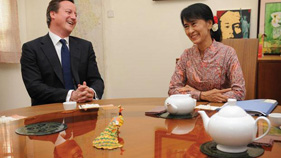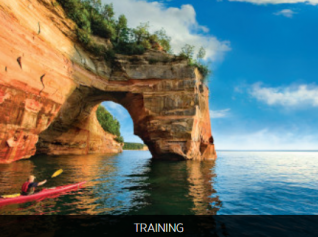to Burma or not to Burma

The current question for responsible tourists
Following the lifting of the tourism boycott by the National League of Democracy, (NLD) in 2011 and the recent visit to Burma of Prime Minister, David Cameron in April the first western leader to enter the country for a generation, UK tourists are asking themselves, whether Burma is now open for business. This has led to campaigning organisation, Tourism Concern to raise the following question:
Is it Ethical To Travel To Burma? The question was posed at a meeting on 16th April in the House of Commons. Four panelists, each linked to Burma in a different way, were asked for their opinion. The first to speak was executive director of the Burma Campaign, Anna Roberts, who stated that while it was not ethical to travel to Burma while the tourism boycott was in place, now it has been lifted, the NLD welcome "individual and small scale tourism that is done in a responsible and environmentally friendly way." This does not mean to say Burma’s problems are gone – far from it. The country still has the worst human rights record in the world. Forced labour is still used to build the hotels and roads for tourists to use, where hundreds of political prisoners are still in jail and military attacks against ethnic minorities such as the Karen and the Shan, regularly occur. The political reforms that have recently taken place in Burma, such as the success of Ang San Suu Kyi in the by election contests, might, Anna Roberts added, simply be a ploy by the military-backed government for getting sanctions lifted.
James Moreton, co-founder of ethical tour operator, Panoramic Journeys who organises trips to Burma, said that it is possible to travel ethically to Burma so long as you direct your tourism spend to the people and not to the government. The trips with Panoramic Journeys support this by promoting homestays and local community run tourism projects. It was to encourage this form of responsible, respectful tourism, ‘raising awareness of the political state of Burma’ as opposed to mass, package tourism, that the NLD chose to lift the boycott. Nyan Moe from the political research and development committee for the NLD, UK, another of the speakers, explained that responsible tourism can only work if there are enough hotel beds to support it and this is not currently the case. He said how a special license is needed from the government for people wishing to open their houses up for homestays and although this is not always heeded, it does prevent more people from doing it. This means that for the majority of tourists visiting Burma, the only option for hotel accommodation are the large, state run hotels. This does not constitute travelling ethically to Burma, as it directly supports the government.
The fourth speaker was travel journalist, Simon Usbourne who wrote a piece for the Independent following his six-day trip to Burma in January. He explained how keen local people appeared to be for tourism, repeating what a local said to him when he asked about tourism. "Tourism is good for the country, because now it is peaceful. If we don’t see foreigners for two or three days, we don’t eat well."
Like the rest of the panelists, Usbourne stated his concern for the country suddenly becoming overcome with tourists (a predicted one-million in 2012).
He talked about his visit to a popular tourist site, U Bein Bridge, (measuring 1.2 km, the longest teak bridge in the world, joining Rangoon with Mandalay) saying how it was overcrowded, there were no railings, it was wobbling and the water was filled with litter.
Moreton explained how all tour operators working in Burma currently take their tourists to the same sites, which, increases the levels of ware and tear and litter. Yet, there are not any regulations in place for protecting them. This is particularly true for Lake Inle, a freshwater lake close to Rangoon, which is beginning to suffer the effects of tourism. It was suggested that tourism numbers to the site are limited, which without a national tourism strategy in place, is the role of tour operators to implement. While there are hopes that UNESCO will preserve these sites it was pointed out that UNESCO only preserves places, as they currently look, not how they once looked. It was suggested that a set of guidelines be drawn up for tour operators informing them about what can and cannot be done/ visited in Burma. This extends to avoiding using ground handlers in Burma who have links to the government.
Tourism is happening in Burma without any laws in place to protect the people or the environment. A member of the audience likened the recent interest in Burma to a gold rush with everyone clambering to get a slice of the next big thing.
The majority of tourists who currently visit Burma are Thai and Japanese who come to the Buddhist monasteries, with the Japanese donating a lot towards their upkeep. While Chinese are major investors in Burma, the comment was made that Burma is not popular with Chinese tourists as there are no shops.
Whether Burma could base its tourism strategy on the highly successful high-end, small scale tourism strategy implemented by the Kingdom of Bhutan was considered debatable as Burma’s new Minister of Tourism comes from a construction and trading background and so is likely to have different views on how to develop tourism. Anna Roberts pointed out that while everybody focuses on tourism to Burma and the ‘new Burma’, what tourism is not going to address is the fact that 25% of the seats in parliament are reserved for the military and that information coming out of the parliament is still very limited. There cannot be a big tourism rush until certain goals have been achieved. These have not been achieved.
In answer to the question, is it ethical to travel to Burma? The main message to come out of the meeting was one of caution. Nobody knows what the government’s ultimate plan is. While it is ethical to travel to Burma to support the local people, the infrastructure to do this effectively is not yet in place therefore tourists run the risk of supporting the repressive regime instead. While everybody wants to cash in on tourism there now, Burma is a fragile country and needs to be treated gently. There are after all many potholes that can be made on the Road to Mandalay.
Abby Aron
Abby Aron [email protected]
Abby Aron is a travel journalist writing for a broad range of newspapers and magazines including The Telegraph, The Times, International Herald Tribune and Time Out Travel guides. She is the author of Buying A House in Morocco, which is a guidebook for people looking to own property in Morocco based on her own experiences of buying, owning and renting out a dar in the Essaouira’s ancient medina.
Keep up with the latest sustainable tourism info, special offers HERE
 United Kingdom
United Kingdom United States
United States Asia Pacific
Asia Pacific












































EU airports bring back 100ml liquid rule
British Airways passengers endure 11-hour 'flight to nowhere'
CLIA: Anti-cruise demos could cause itinerary changes in Europe
Co-pilot faints, easyJet flight issues ‘red alert’
Dozens fall ill in P&O Cruises ship outbreak